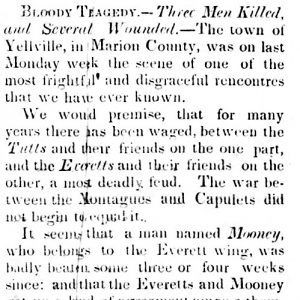calsfoundation@cals.org
Tutt-Everett War
aka: King-Everett War
The Tutt-Everett War began as a struggle over political power in Marion County in the 1840s. Though centrally involving the Tutt and Everett families, the contest attracted many county residents to one side or the other. It spanned nearly a decade of increasingly violent confrontations, claiming the lives of up to fourteen people.
The Arkansas legislature created Marion County in 1836. In its early politics, the Everetts and their supporters became identified with the Democratic Party, while the Tutts and their supporters were associated with the Whig Party. The two sides clashed repeatedly as they competed for electoral office and thus control of the county. Driving the conflict was the knowledge that if “their side” held political power, one could get away with most anything in the county. There were approximately 300 voters in Marion County at this time, split almost evenly between the competing parties; county elections were unpredictable affairs.
In the midst of rising tensions, a public debate was held in the town of Yellville (Marion County) in 1844 during the presidential campaign of that year. William Denton spoke in support of the Whig candidate Henry Clay, while Jonas Trivett spoke in support of Democratic candidate James Polk. A large crowd assembled to hear the speakers, and as the debate neared its completion, a violent brawl erupted among the spectators. Though no one was seriously injured, the event is regarded as the start of the Tutt-Everett War.
Alcohol-fueled fights and occasional gunfire continually increased the ill will. On October 9, 1848, a shootout erupted before a town meeting in Yellville, resulting in several deaths, including that of Simmons “Sim” Everett, the most feared member of the Everett family. On August 31, 1849, relatives and supporters of Everett ambushed and killed several members of the King family, who had participated in the shootout on the Tutt side.
Fearing that law and order had disintegrated in Marion County, Governor Thomas Drew authorized a militia from neighboring Carroll County to enter the county to restore order. The militia arrested members of the Everett gang but was disbanded after six weeks; after its departure, Everett supporters broke into the jail where the prisoners were being held and released them.
The final act of the war occurred in 1850 with the murder of Hansford “Hamp” Tutt, the senior member of the Tutt clan. Knowing he was a marked man, Tutt had been taking precautions for the past year but was eventually ambushed and shot, dying days later. Before he died, he reportedly asked that no revenge be taken, and the main surviving parties to the feud dispersed around the country.
For additional information:
Blevins, Bill Dwayne. The Tutt & Everett War. Mountain Home, AR: Bill Blevins, 2002.
Flippin, W. B. “The Tutt and Everett War in Marion County.” Arkansas Historical Quarterly 17 (Summer 1958): 155–163.
Hughes, William. “Family Feud Turns into Full Scale War.” Arkansas Democrat Sunday Magazine, March 30, 1986, pp. 4, 5, 12.
Leland L. Razer
Central Arkansas Library System







Although the date of the death of Simmons Everett was on Oct. 9, 1848, the death of the members of the King family happened almost a YEAR later.
Quoting from the court records found in the Arkansas History Commission:
Whereas on the 3rd day of September AD 1849 in the county and state aforesaid information hath been given to me on oath. That on the 31st day of August AD 1849 in the county and state aforesaid JESSE N. EVERETT, NELSON STRATTON, WILLIAM H. EVERETT, ARCHIBOLD EVERETT, JOHN EVERETT, JR., GEORGE HAMLET, JESSE EVERETT, JR. [my ancestor], ALEXANDER COWAN, ROBERT ADAMS, AND THOMS F. STEPHENS, did with pistols, rifles, shotguns, and muskets, willfully, maliciously, and deliberately shoot, kill, and murder LOOMIS Y. KING, WILLIAM Y. KING, SR. and WILLIAM Y. KING, JR.
Most of the articles about the feud contain gross errors, and few people have taken the time to look at the official records that have survived or done the proper research to make the historical record as correct as possible. I have researched Jesse N. Everett and found that he actually died in Dallas Co., Texas, in Dec. 1849, according to the 1850 Texas Mortality Schedule. He did not die in Shreveport, Louisiana, nor could he have fired the shot which killed Hansford Tutt because he was already deceased on that date.
Hosea W. King is my great-great-great-grandfather, and I have done extensive research on the feud.